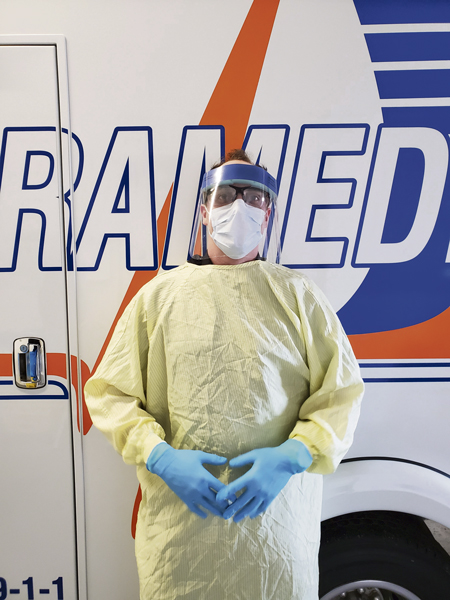
Parkland Ambulance is looking back on 2020, and how the COVID-19 pandemic changed their responses to calls and cleaning protocols.
One change is the extra amount of PPE that paramedics wear now, such as gowns.
Director of Public Affairs for Parkland, Lyle Karasiuk said that typically before COVID-19, paramedics would only wear gowns when responding to calls where patients were highly infectious or a maternity call.
“It wasn’t a routine piece of their uniform or their care, now it’s an every day part of what they do,” Karasiuk said.
Now on every single call, paramedics wear gowns, goggles, face shields and different masks for different procedures.
An issue faced by paramedics is the fact that they respond to between 20-30 calls a day, which means they’re often going from call-to-call, Karasiuk explained.
Parkland continues to work on their cleaning protocols to ensure “germs” aren’t transferred between calls.
Karasiuk said paramedics spray disinfectant on their pants and boots, where there gowns don’t reach. They also remove and clean uniforms after each shift.
“When I look at our men and women now and the uniforms that they have on, are there better ways that we can make sure that we’re not bringing that stuff back with us and/or if we’re going from another call to another call that we’re not simply taking that to somebody else’s house?” Karasiuk questioned.
He added that paramedics are completing infection control processes the best they can but the pandemic has taught them a lot of new things, such as how to improve cleaning. Karasiuk said cleaning measures like HEPA filtrations, UV lights, and Ozone cleaning “are all on the table for enhanced levels of cleaning in our industry.”
“What we need to start to think of is that because we do a job that is repetitively going in and out of situations, which by nature are inherently dirty, how do we make sure we’re the cleanest we possibly can be each and every time we step foot in your home,” Karasiuk said.
With the added stress and pressure from the pandemic, Karasiuk also spoke about several mental health supports accessible for staff.
At the beginning of 2019, Parkland introduced new mental health strategies and a family assistance program.
“Thank goodness that we did because that has allowed our staff I think to come out better on the other side(now) that they have the resources,” Karasiuk said.
Team leaders, also known as shift supervisors, are all trained as peer support persons with “basic debriefing and defusing skills.” Training was provided by staff within the Saskatchewan Health Authority.
There’s also specific peer support resources and other staff who are trained in peer support and external resources like counselling if needed.
“I think they’re coming out on the better side of it, being able to talk to people, having resources both internally and externally that help them get through the day in a better frame of mind,” Karasiuk said.
Peer support individuals are trained to notice when someone may be having a bad day and how to have a conversation with staff members that are struggling. Staff are also aware that they can reach out to their peer supports if they need someone to talk to.
Karasiuk estimates that majority of the time, the peer support team is able to handle “soft issues” before they become a “nagging problem” that requires external resources.

